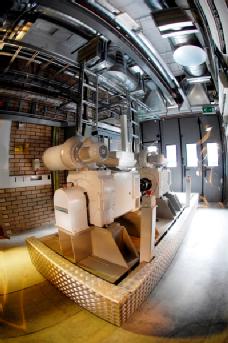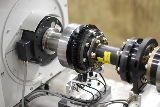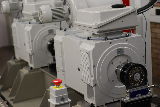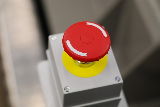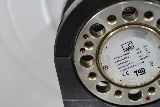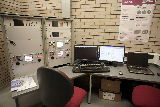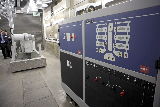Hybrid electric (rail) systems
Hybrid Electric Powertrain Systems for Rail and Heavy Vehicle ApplicationsThe UK Government’s carbon reduction strategy for transportation stresses the need for decarbonising transport as an essential part of building a low carbon future for Britain. This will be achieved through a mix of technology solutions that includes increased fuel efficiency, the use of sustainable biofuels and hybrid electric vehicles. The railways will see a major programme of electrification and the potential introduction of diesel hybrids. The Department for Transport is working with the Universities of Birmingham and Warwick in developing concept designs for these hybrid vehicles and the new Birmingham Science City Energy Systems Integration Laboratory (ESIL) will further enhance this work. The laboratory - unique within the UK and world leading - brings together cutting edge dynamometer, energy storage, simulation and instrumentation technologies to provide a highly flexible research facility for the evaluation and design of hybrid electric traction systems. The equipment will enable hybrid electric traction systems to be configured and designed for railway applications. The test facility will also include the capability to integrate energy storage devices into traction systems. The control and optimisation of these systems represents a serious academic challenge and it is envisaged that the state of the art laboratory will enable considerable advances in system development.
The key features of the ESIL facility are:
The laboratory facilities are flexible and they will also be available for testing of hybrid electric drive systems for a range of applications including:
The lab has full ethernet capability which will enable the test facilities in ESIL Birmingham to be synchronised with other labs across the Birmingham and Warwick University campuses. The ESIL research is led by Dr Stuart Hillmansen, an expert in vehicle simulators and hybrid traction systems, and Dr Clive Roberts who has expertise in condition monitoring, asset management and systems engineering. The Birmingham Centre for Railway Research and Education brings together a multidisciplinary team from across the University of Birmingham to tackle fundamental railway engineering problems. The team actively engages with industry and other universities through Rail Research UK, and international partners. The research group is keen to develop new partnerships, particularly through ESIL, with local businesses from the West Midlands region.The centre also delivers the MSc postgraduate programme in Railway Systems Engineering and Integration. For further information, including proposals for collaboration or access to the facilities: Danushka Meegahawatte (facility manager), School of Electronic, Electrical and Computer Engineering, University of Birmingham,
Mike Ahearne, Business Engagement Manager for the Birmingham Science City Energy Efficiency & Demand project. Email: m.ahearne@warwick.ac.uk Mobile tel: +44 (0)7824 541173
|
These facilities are based at the University of Birmingham
Download this information in brochure format. Click here ESIL electric hybrid testing rig (rail)
![]()
For more technical detail about the facility click here![]()
